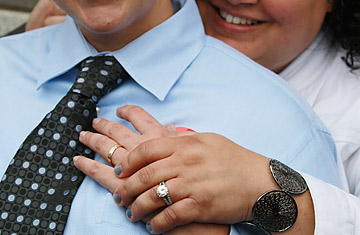
Same-sex couple Kristen Orbin, right, and Teresa Rowe embrace in San Francisco as they wait to hear a decision on whether same-sex marriages will be allowed to resume in California
If same-sex weddings resume in California next Thursday, the happy couples may have more names to add to their thank-you lists than that of U.S. District Judge Vaughn Walker, the San Francisco jurist who last week struck down the 2008 voter-approved constitutional amendment that made gay marriage illegal. They may have to address new cards to Governor Arnold Schwarzenegger and California attorney general Jerry Brown.
That's because Brown and Schwarzenegger's choosing not to appeal Walker's Aug. 4 ruling — and their contention that the state is ready to begin issuing same-sex wedding licenses immediately — may turn out to be almost as decisive a factor as the historic court ruling last week. That possibility emerged Thursday in an 11-page ruling Walker issued to deny a request by Proposition 8's proponents for him to delay implementing his own ruling allowing gay marriage until they can appeal the case to the Ninth Circuit and perhaps all the way to the Supreme Court.
But in a twist that caught some experts off guard, Walker not only denied the motion but did so in a way that raises serious questions whether Prop 8 proponents have any right to appeal the case at all. He ruled that they not only failed to show that the resumption of gay marriage would do them personal, irreparable harm, but that they likely lacked the legal standing to request to appeal. Instead, he suggested, their only remedy may be a political one — as unlikely as that may be. "In light of those concerns, proponents may have little choice but to attempt to convince either the Governor or the Attorney General to file an appeal to ensure appellate jurisdiction," he wrote.
Walker's reasoning is this: the actual defendants in the lawsuit brought by two same-sex couples last year weren't the folks who brought Prop 8 to the ballot two years ago. Instead, the suit named Schwarzenegger and Brown. When those two officials declined to mount a defense — an unusual and controversial decision by Brown, whose job normally includes the defense of all state law — Walker allowed the group behind ProtectMarriage.com to step in and defend the case at trial. But, he said in Thursday's order, just because they were allowed to intervene to defend Prop 8 at trial doesn't mean that they would have independent standing to bring an appeal in the event that the named parties in the case chose not to do so. "When proponents moved to intervene in this action, the court did not address their standing independent of the existing parties," he wrote. "This court has jurisdiction over plaintiffs' claims against the state defendants pursuant to 28 USC S 1331. If, however, no state defendant appeals, proponents will need to show standing in the court of appeals."
That could mean trouble for the proponents. Walker gave the proponents until 5 p.m. on Aug. 18 to take their motion for a stay to the Ninth Circuit, where three judges who serve on a monthly motions panel will likely hear it. If they uphold Walker's ruling denying the stay, the only recourse for the proponents will be to ask the Supreme Court to intervene. To do so means asking the justice assigned to the Ninth Circuit to hear the motion. Ironically, in this case, that would be Justice Anthony Kennedy, the court's frequent majority maker who Supreme Court oddsmakers have long said holds the decisive vote if the question of gay marriage is ever decided there.
But if the appellate judges agree with Walker that the proponents lack standing to appeal, the case may never reach the appellate courts at all, at least not on its merits. That would mean a win for gay marriage in California, as it rejoins the five other states (and D.C.) where gay marriage is legal. But it would also mean that the case would have much less national importance. The first federal decision — Walker's — ruling in favor of gay marriage would remain the only one, and would have no direct impact on marriage laws in any other state.
And to add another twist, at least one constitutional-law scholar in California is suggesting that by trumpeting the issue of standing, Walker has opened a hornet's nest he may have been better off leaving undisturbed. "If the proponents don't have standing to appeal, then it's entirely plausible that the courts will rule that they did not properly have standing to go to trial," Vikram Amar, a law professor at the University of California at Davis, told TIME Thursday evening. "This is an issue he glossed over when he allowed them to intervene in the trial."
Amar says that if the Ninth Circuit agrees with Walker that the proponents don't have standing to appeal, the judges may well decide they shouldn't have been allowed to intervene in the case at all. If they do, he says, they could decide to vacate the trial entirely, sending it back to Walker to start over. The governor and attorney general would be unlikely to intervene — but on the other hand, come November, voters will choose new candidates for both of those offices.
In that event, what happens next is anybody's guess. "We're in uncharted waters here," Amar told TIME.
